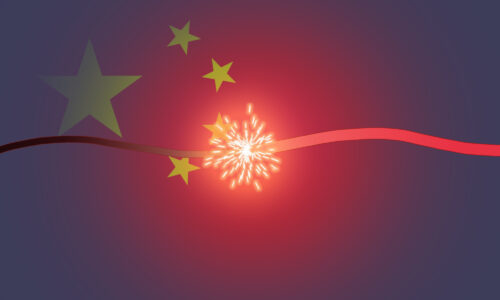How Beijing sees the world: Contextualizing Chinese foreign policy
Review: "The World According To China" by Elizabeth Economy

It’s perhaps easy enough to aggregate the reporting on the actions of the Chinese government in recent years so as to lay out the moves from Beijing. What’s rather harder is to contextualize these stories, to broaden the reader’s understanding and to tie these into an overarching thesis. (I felt this was the main flaw of China Unbound by Joanna Chiu: the reporting was excellent, but for a book we expect more; it’s not enough to say what, we need to understand why and how.)
So it comes as a great pleasure to read a book that sets out almost explicitly to do that. Elizabeth Economy is a highly credentialed American expert on China, currently serving as senior foreign advisor for China in the U.S. Department of Commerce, and having previously been senior fellow at both the Hoover Institution and the Council on Foreign Relations. She has previously written The Third Revolution: Xi Jinping and the New Chinese State (2018), which was an excellent take on reforms and grand designs of Xi Jinping’s time in office thus far. The World According To China, however, looks more centrally at Chinese foreign policy over the past decade or so (although foreign policy isn’t quite a strong enough term, as she demonstrates).
The book is thus in parts a tour d’horizon around the recent actions and effects of Chinese foreign policy, an explainer on the domestic, personal, and economic pressures producing these strategies, and a series of prescriptions for other nations (particularly the U.S.) to manage them. Each chapter tackles a key area, such as “Politics and the Plague” (which is naturally chapter 1), “Reunifying the Motherland,” and “From Bricks To Bits.” Each is broken down into numerous mini-sections, most a few pages long, which keeps the text feeling brisk (which is something of a relief, as there’s little humor or human anecdote to the book).
We thus go over the policies and effects of China’s coronavirus management as they pertain to its desire for global leadership; China’s use of power in diplomacy (the key term here is “sharp power,” defined as “a form of coercive economic power that it can deploy in pursuit of its objectives” — as in Beijing’s recent treatment of Lithuania), its actions in Hong Kong, Taiwan, and the South China Sea; the global effects of the Belt and Road Initiative (and concomitant Digital Silk Road); China’s efforts in digital governance and technology standards; and its efforts to recast global governance to its own liking. What comes across is the systematic nature of its activities and the all-encompassing breadth of its vision. Economy demonstrates the scale of Beijing’s ambition to reorder the world to its liking. For all of Xi Jinping’s talk of “building a community of shared human destiny,” the vision is one of China as the locus of power, disseminating largesse as it once granted imperial favor, in return for acknowledgement of its own majesty.
The best aspect of the book, as I’ve said, is that Economy locates Chinese actions within a governing philosophy and policy framework. Economy demonstrates how the Chinese government wants to entirely change the diplomatic order, with itself as the key locus. The world must change for China. As she quotes the Singaporean foreign minister: “China doesn’t just want you to comply with its wishes, it wants you to think in such a way that you will, of your own volition, do what it wants without being told.” This is more precisely called hegemony. And the means for achieving it?
To achieve its strategic objectives, Beijing seeks to place Chinese officials in leadership positions within global governance institutions; flood the institutions’ expert committees with its representatives; coordinate all relevant public and private actors to advance its interests; provide financial contributions that are targeted to realizing its domestic priorities; and ensure close integration between its initiatives within international institutions and domestic policy priorities.
Such entryist methods should be familiar enough to anyone with a passing knowledge of Leninist parties. The question is, are global institutions ready for them, when they are the methods of a globally powerful state? In the “Rewriting the Rules of the Game” chapter (from which this quote was taken), Economy examines China’s playbook in four areas — the Arctic, human rights, cyber-governance and technology standards, and development finance — and appraises the successes and limits of this playbook.
The main issue, seen repeatedly, is one of values. China may be building infrastructure around the world, it may be sharing COVID vaccines, it may be developing 5G and IOT dominance, and it may be establishing “core interests” from the Arctic to South America and Africa. Yet the key fact is that increased interaction with China — despite its “win-win” rhetoric — frequently produces negative results. Economy notes that “while investment and aid generally add to China’s soft power, its trade creates overwhelmingly negative perceptions.” Similarly, “even favorable attitudes towards Chinese investment do not guarantee an overall positive view of China.” And little wonder: it’s hard to trust someone when they frequently demonstrate a willingness to abuse any leverage they have. Each use of sharp power effectively destroys China’s soft power.
The final chapter, “The China Reset,” is where Economy summarizes China’s relationship with the U.S., and then suggests methodologies for handling them. The prescriptions are intelligent and worth considering. The key term is, once again, values. Framing the conflict between the U.S. and China as one between a dominant power and a rising power makes every advance by China seem a victory. Rather, Economy suggests, “A framework that embraces values and norms […] is more likely to engage U.S. allies and partners. Conflict in the South China Sea becomes a normative challenge by China to freedom of navigation and international law rather than a competition for military dominance.”
Given Economy’s proximity to the levers of power, though, I perhaps slightly unreasonably wondered why she did not ask American ministers for their thoughts. It’s fine for the journalist or policy analyst to propose: it would be wonderful to hear what the political actors think, and to lay out what has been done, why certain ideas might not work, and so on. Perhaps that’s unfair to complain about, as no one else does it, but it would be fun to read.
The other aspect of The World According To China is its unremitting seriousness. While always enlightening and well-argued, it’s somewhat dry. Clearly Economy is aiming it at the serious side of the reading market, toward think tankers, policymakers, and statesmen. (It’s a very Washington, D.C., book, if you know what I mean). But I refuse to believe that seriousness and verve cannot coexist: the greatest political writers, from Karl Marx to JK Galbraith to Peter Hennessy, continually demonstrate otherwise. I’m not asking for flippancy in a book concerning some of the most important geopolitical issues on earth, but Economy’s prose can be somewhat leaden. There are no changes in tone, or sentence structure, or arresting images. On the other hand, such gravity suggests the book’s numerous strengths: it’s extremely well informed, cogently argued and deftly structured, with intelligent prescriptions. You also feel like you’re getting the inside track to U.S. government thinking, which is highly valuable (especially considering the impenetrability of the Chinese side). Yet I came away feeling I would never read the book again. The World According To China is ultimately a hard-headed, pragmatic book, rather than one to savor.
For more book reviews, see our Reading China archive.






